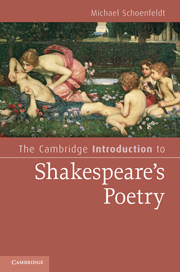Book contents
- Frontmatter
- Contents
- Acknowledgments
- Chapter 1 Shakespeare and English poetry
- Chapter 2 Shakespeare's banquet of sense
- Chapter 3 Constraint and complaint in Lucrece
- Chapter 4 Mysteries of the Sonnets
- Chapter 5 Time and mortality in the Sonnets
- Chapter 6 Friendship and love, darkness and lust
- Chapter 7 Solitary and mutual flames
- Chapter 8 Fantasies of Shakespearean authorship
- Notes
- Further reading
- Index
- Cambridge Introductions to Literature
Chapter 7 - Solitary and mutual flames
A Lover's Complaint and “The Phoenix and Turtle”
Published online by Cambridge University Press: 05 June 2012
- Frontmatter
- Contents
- Acknowledgments
- Chapter 1 Shakespeare and English poetry
- Chapter 2 Shakespeare's banquet of sense
- Chapter 3 Constraint and complaint in Lucrece
- Chapter 4 Mysteries of the Sonnets
- Chapter 5 Time and mortality in the Sonnets
- Chapter 6 Friendship and love, darkness and lust
- Chapter 7 Solitary and mutual flames
- Chapter 8 Fantasies of Shakespearean authorship
- Notes
- Further reading
- Index
- Cambridge Introductions to Literature
Summary
The Phoenix riddle hath more wit
By us; we two being one are it.
– John DonneThis chapter will focus on two very different poems, with hugely different perspectives on love. Both are part of larger collections, and both acquire some of their meaning through their specific contexts: A Lover's Complaint was printed in 1609 at the end of the Sonnets (although it is not mentioned on the title page of the volume), and “The Phoenix and Turtle” was published in 1601, in a collection of verses by various writers appended to a volume entitled Love's Martyr. “The Phoenix and Turtle” is an abstruse semi-philosophical work that uses the literary idea of a meeting of various species of birds to explore the paradoxical unity achieved by two separate beings through love. A Lover's Complaint is the grief-stricken lament of an abandoned female lover. Both poems show Shakespeare inhabiting and exploding inherited genres and modes. If “The Phoenix and Turtle” is Shakespeare sounding like John Donne at his best, A Lover's Complaint is Shakespeare sounding like Edmund Spenser on a good day (something he also does in Sonnet 106). One recent critic has judged A Lover's Complaint as unworthy of Shakespeare, and has argued vigorously that the poem is not by him. There have been fewer questions about the authorship of “The Phoenix and Turtle,” despite the fact that the circumstances of publication are similar. Perhaps this is because “The Phoenix and Turtle” is universally acknowledged as a small masterpiece; the poem has been aptly termed “the first great published metaphysical poem.”
- Type
- Chapter
- Information
- The Cambridge Introduction to Shakespeare's Poetry , pp. 112 - 129Publisher: Cambridge University PressPrint publication year: 2010

